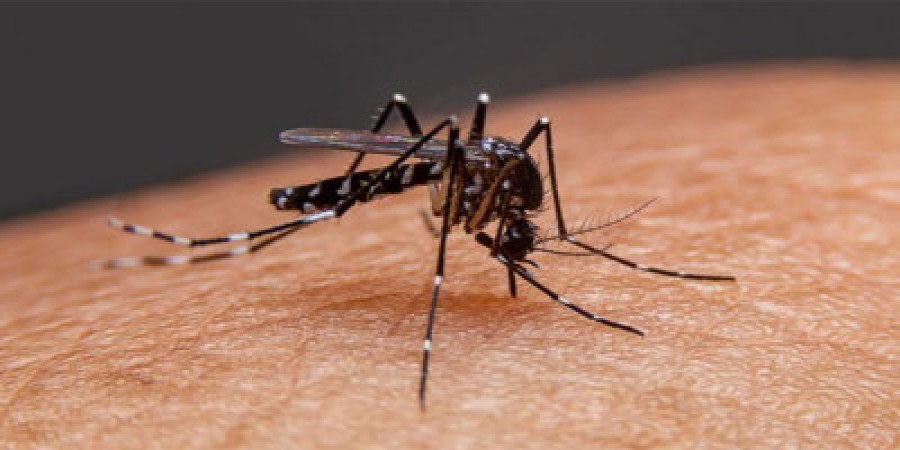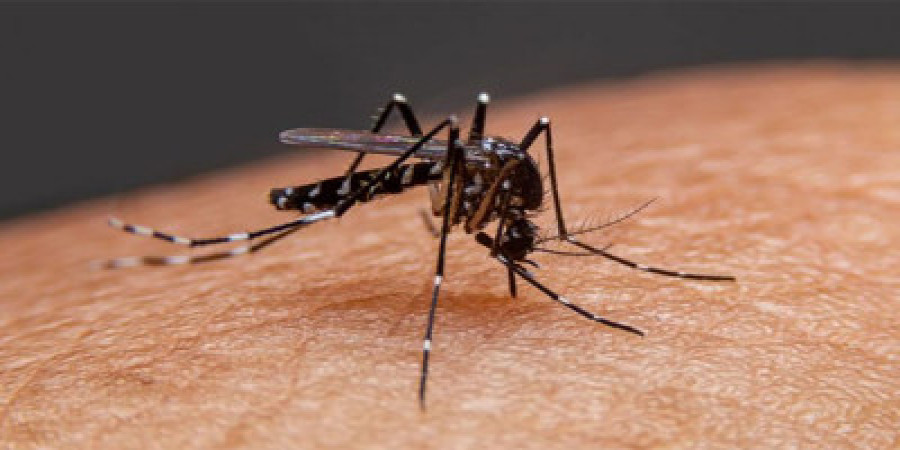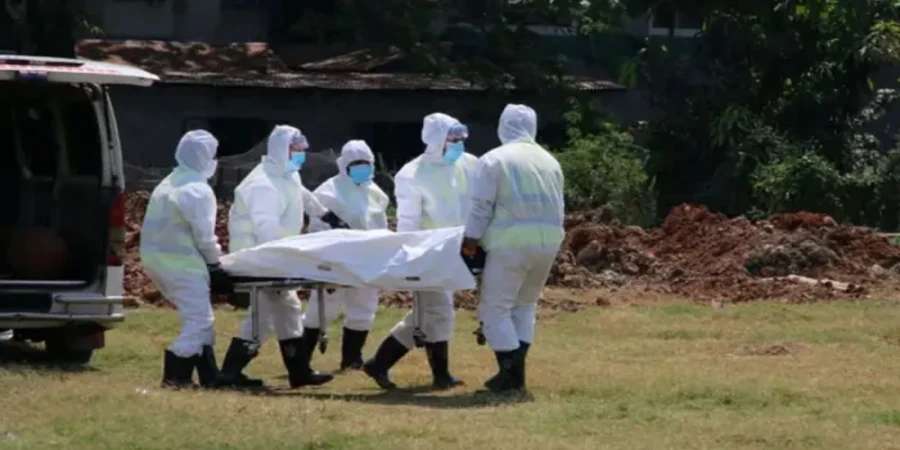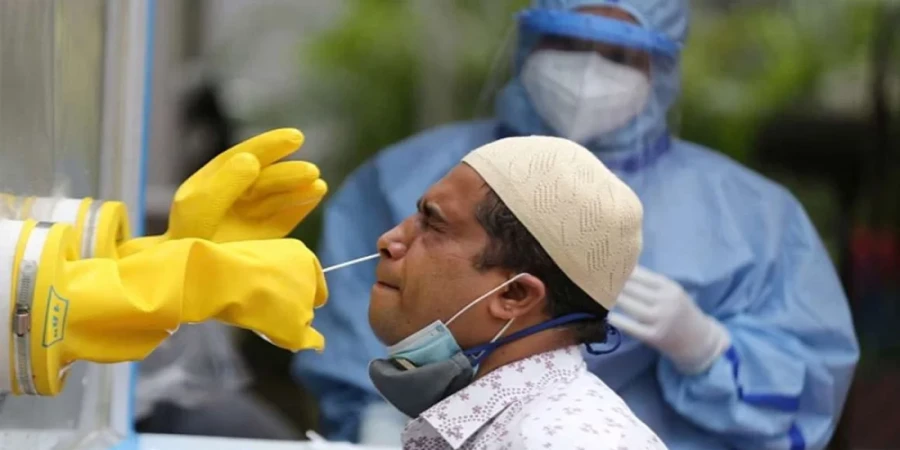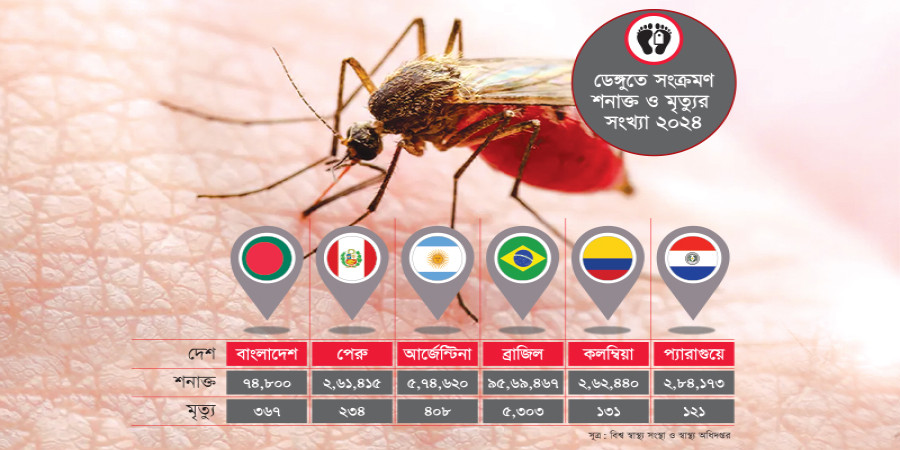
ছবি: Photo: Collected
As of 2024, dengue cases worldwide have surpassed 13 million, according to data from the World Health Organization (WHO) and the European Centre for Disease Prevention and Control (ECDC). Most cases were recorded in North and South America, with Brazil, Argentina, Peru, Colombia, and Paraguay experiencing the highest numbers. Brazil alone has reported over 9.5 million cases, while Argentina, Peru, Colombia, and Paraguay have reported between 200,000 to 600,000 cases each.
Despite the high number of cases in these countries, Bangladesh ranks third globally in dengue-related deaths. According to the Directorate General of Health Services (DGHS), Bangladesh has reported 74,800 dengue cases this year, with 367 deaths. This places Bangladesh behind only Brazil and Argentina in dengue mortality for 2024.
Data from the WHO’s Pan American Health Organization (PAHO) shows Brazil has recorded the highest number of deaths due to dengue, with 5,303 fatalities out of 9.57 million cases, a mortality rate of 0.05%. Argentina follows with 408 deaths among 574,620 cases, a mortality rate of 0.07%. Paraguay, with 284,173 cases, reported 121 deaths (0.04%), and Colombia, with 262,440 cases, reported 131 deaths (0.05%). Peru’s mortality rate is the highest at 0.09%, with 234 deaths among 261,415 cases.
Experts attribute the rise in dengue cases and fatalities in Bangladesh to climate change, rapid urbanization, and ineffective mosquito control measures. Alongside dengue, other mosquito-borne diseases like chikungunya, Japanese encephalitis, malaria, and Zika virus have also been detected. Managing the surge in cases has posed significant challenges to public health.
Dr. Sheikh Daud Adnan, Director of Disease Control at DGHS, explained that many patients delay seeking treatment, which results in a higher risk of severe complications and death. Patients with pre-existing health conditions, such as kidney disease, diabetes, pregnancy, or old age, are particularly vulnerable to severe outcomes when infected with dengue.
Public health experts point out that patients with complex health conditions often do not survive despite intensive care. Inefficient fluid management and inadequate tracking of platelet levels also complicate patient care in Bangladesh. Moreover, factors such as climate change, poor drainage systems, lack of awareness, and overcrowded urban areas have exacerbated the spread of dengue and increased the death toll.
Dr. Kabirul Bashar, an entomologist and professor at Jahangirnagar University, emphasized the need to identify dengue hotspots to manage mosquito populations effectively. He pointed out that since the last rainfall in late October, breeding sites are now confined to specific “pockets” where water remains, allowing mosquitoes to reproduce and spread the virus.
The International Centre for Diarrhoeal Disease Research, Bangladesh (icddr,b) warns that climate change will have a profound impact on public health, especially in densely populated low-lying countries like Bangladesh, increasing the spread of vector-borne diseases such as malaria, dengue, and Japanese encephalitis. WHO estimates that dengue infects around 400 million people annually, with half the global population at risk. In tropical and subtropical climates, urban areas experience the highest dengue prevalence.
Experts stress that a comprehensive, year-round mosquito control strategy is essential for managing dengue outbreaks. Local governments and healthcare sectors often blame each other, leading to a lack of coordinated efforts. Many patients receive treatment in private hospitals, but their cases are not reported in official statistics, contributing to an underestimation of the outbreak’s true scale. Environmental changes have also led Aedes mosquitoes to adapt and survive in polluted water sources, biting both day and night, which further complicates eradication efforts.
Dr. Mushtaq Hossain, former advisor at the Institute of Epidemiology, Disease Control, and Research (IEDCR), stated that poor sanitation and stagnant water in urban and rural areas provide breeding grounds for mosquitoes, fueling the spread of dengue. According to him, recent rains could sustain the current dengue outbreak for another two months, and the October rains may continue to drive new infections.
Dengue was first identified in 1780 and spread across Asia in the 1950s, with initial outbreaks in Thailand and the Philippines. It reached Kolkata in 1963 and Dhaka in 1964, where it was initially termed “Dhaka fever.” The first official dengue outbreak in Bangladesh occurred in 2000, with over 5,500 cases and 93 deaths. Despite government efforts over the past two decades, the spread of dengue has proven difficult to control due to challenges in mosquito management and patient care.
repoter



